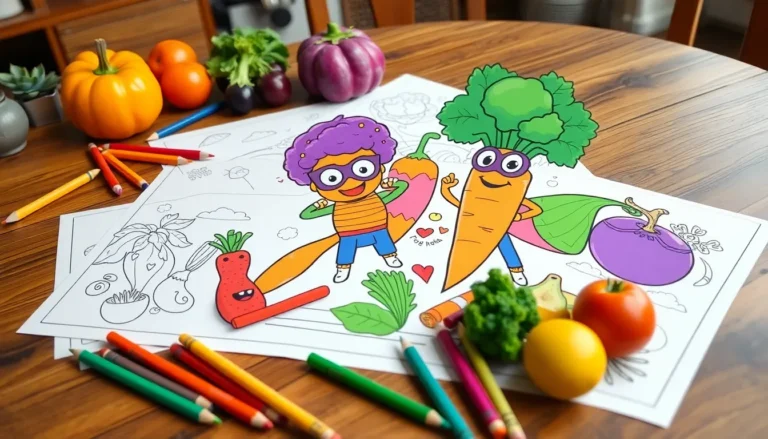In a world overflowing with information, mastering the art of reading, writing, and language development is like having a superpower. Imagine effortlessly decoding the mysteries of the written word while impressing friends with your eloquent prose. It’s not just about knowing how to string a few sentences together; it’s about unlocking doors to endless opportunities and connections.
Table of Contents
ToggleLearning And Literacy: Reading, Writing And Language Development
Mastering reading, writing, and language development forms the foundation for effective communication. Proficient readers decode and comprehend texts, which enhances their understanding of various subjects. Writers express thoughts and ideas clearly, allowing for meaningful interactions with others.
Language development occurs in stages, each crucial for building communication skills. Children typically progress through these stages during their early years, characterized by increased vocabulary acquisition and syntax understanding. Engaging with diverse literature expands exposure to varied language structures, enriching cognitive development.
Effective reading practices promote critical thinking and analytical skills. Strategies such as summarization, questioning, and prediction improve comprehension. Adults who model these techniques influence children’s learning experiences. Consistent practice in writing leads to improved skills in organizing thoughts and articulating arguments.
Incorporating language-rich environments supports ongoing development. Conversations with caregivers and peers foster vocabulary growth and sentence complexity. Immersive experiences in different linguistic contexts enhance adaptability in communication.
Learning materials should vary to provide comprehensive exposure. Multimedia resources, including audio books and educational videos, cater to diverse learning preferences. Collaboration with peers during writing tasks encourages feedback and revision, strengthening overall language proficiency.
Encouraging exploration of language through storytelling nurtures creativity. Activities such as role-playing and word games engage learners and enhance retention. Celebrating linguistic diversity cultivates appreciation and respect for different cultures.
The Importance Of Early Literacy

Early literacy is crucial for children’s overall development. It sets the stage for successful reading and writing skills that last a lifetime.
Foundations Of Reading Skills
Mastering reading skills involves several key elements. Engaging with books regularly helps build vocabulary and comprehension. Children learn to recognize letters and sounds through phonics instruction. A strong foundation includes identifying sight words, which accelerates reading fluency. Practicing these skills in varied contexts enhances understanding. Reading aloud to children creates a shared experience and fosters a love for literature. Conversations about stories deepen comprehension, encouraging critical thinking. Incorporating diverse genres broadens exposure and strengthens cognitive abilities.
Developing Writing Abilities
Writing skills develop alongside reading skills. Encouraging children to express their thoughts on paper solidifies their understanding of language structure. Journaling provides a platform for them to explore creativity and practice writing. Regular feedback helps improve writing clarity and coherence. Using writing prompts can inspire children to articulate their ideas more freely, enhancing their confidence. Introducing collaborative writing activities fosters teamwork and communication. Celebrating their work encourages a positive attitude towards writing, reinforcing its importance in their education. Developing these abilities early on equips children with essential lifelong skills.
Strategies For Effective Learning
Effective learning enhances reading, writing, and language skills through targeted strategies.
Interactive Reading Techniques
Interactive reading techniques engage learners and improve comprehension. Asking questions during reading sessions encourages participation and critical thinking. Visual aids, such as story maps, help illustrate main ideas and support memory retention. Summarizing key points after reading promotes reflection and reinforces understanding. Pairing students for shared reading fosters discussions that deepen insights. Incorporating diverse genres also broadens perspectives and encourages curiosity. These techniques create a dynamic learning environment, nurturing a love for reading.
Writing Prompts And Exercises
Writing prompts and exercises stimulate creativity and enhance writing skills. Daily journals encourage self-expression and reflection on personal experiences. Open-ended prompts allow for exploration of diverse topics, fostering thoughtful responses. Group writing activities promote collaboration and peer feedback, enhancing clarity and coherence. Encouraging storytelling cultivates imaginative thinking and narrative structure. Utilizing digital tools can further engage learners, making writing interactive and fun. Regular practice with varied activities strengthens overall writing proficiency.
Language Development Milestones
Language development milestones play a critical role in understanding a child’s ability to communicate. Tracking progress helps identify strengths and areas needing attention.
Understanding Language Acquisition
Understanding language acquisition involves recognizing how children learn to communicate effectively. Babies start by cooing and babbling, gradually moving towards recognizable words and phrases during their second year. By age two, many can combine two or three words to form simple sentences. Vocabulary growth accelerates rapidly from ages three to five, with children typically learning new words daily. Sentence complexity increases as they enter school, reflecting their growing grasp of grammar and syntax. Familiarity with diverse words and speaking opportunities directly influences their language skills. Engaging children with rich language experiences fosters a strong foundation for literacy development.
The Role Of Play In Language Skills
Play acts as a powerful tool for enhancing language skills in young children. Through imaginative play, they practice vocabulary and sentence structures while interacting with peers and caregivers. Storytelling, a common play activity, allows them to explore narratives, enhancing comprehension skills. Collaborative games often involve listening, following instructions, and expressing thoughts, all of which contribute to language development. Social interactions during play foster group discussions, improving conversational abilities. Integrating songs and rhymes encourages phonemic awareness, a critical aspect of reading readiness. Overall, playful experiences create a joyful learning environment that nurtures effective communication.
The Impact Of Technology On Literacy
Technology’s influence on literacy is significant and growing. Digital platforms enhance reading, writing, and language development in various ways.
Digital Learning Tools
Digital learning tools provide interactive platforms that engage students and support diverse learning styles. Applications like e-books and language-learning software cater to different age groups and skill levels. Students may use features such as audio support and interactive quizzes to reinforce comprehension. Furthermore, collaborative tools, such as virtual writing platforms, allow for real-time feedback and peer interaction. Incorporating gamified learning experiences motivates learners to improve their skills while enjoying the process.
Online Resources For Readers And Writers
Numerous online resources support both readers and writers in their literacy journey. Websites like Project Gutenberg offer free access to a vast array of texts, broadening reading opportunities. Writers benefit from platforms like Grammarly, which provides instant feedback on grammar and style. Additionally, MOOCs (Massive Open Online Courses) offer courses focused on improving literacy skills, fostering professional development. Blogs dedicated to writing tips provide insights into effective communication strategies, cultivating creativity. By utilizing these resources, individuals enhance their abilities and deepen their engagement with language.
Mastering reading, writing, and language development is essential for success in today’s world. These skills empower individuals to navigate information effectively and engage in meaningful communication. By fostering a love for literature and encouraging interactive learning, educators and parents can create rich language environments that nurture growth.
As technology continues to evolve, embracing digital tools enhances literacy experiences. Utilizing diverse resources not only broadens access to knowledge but also caters to varying learning styles. Ultimately, investing in language skills lays the groundwork for lifelong learning and opens doors to countless opportunities, ensuring individuals are well-equipped for the future.





